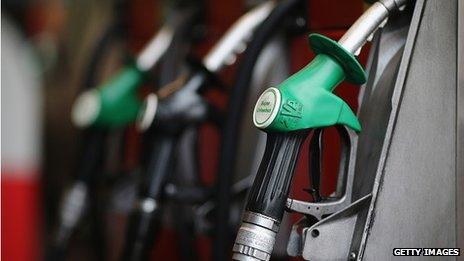Mark Carney says inflation could turn negative in spring
- Published
Mark Carney, governor of the Bank of England: "Inflation is at its lowest level since the introduction of inflation targeting two decades ago"
Inflation in the UK could temporarily turn negative in the spring because of falling oil prices, the governor of the Bank of England has said.
Launching the Bank's inflation report, external, Mark Carney added that prices were likely to rebound around the turn of the year, so this did not mean the economy had entered deflation.
But he said if low inflation persisted, the Bank could cut rates further.
Inflation stands at 0.5%, the joint lowest level on record.
That is well below the Bank's target of 2%, and prompted a letter, external from Mr Carney to Chancellor George Osborne explaining the situation.
In it, he says that "the UK is not experiencing deflation" and that the "most important single reason for below-target inflation over the past year is the unexpected recent sharp drop in energy prices".
"On the assumption that energy and food prices stabilise, CPI inflation should pick up notably once earlier declines start to drop out of the annual comparison, towards the end of this year, " he writes.
Mr Carney said that the headlines on inflation masked an underlying stronger economy. He has revised up the Bank's growth and wage forecasts.
For this year and next, the Bank of England sees economic growth of 2.9%. The 2016 prediction is an increase from a previous estimate of 2.6%. Wages are forecast to rise by 3.5% this year, having risen by 1.75% in 2014.


Analysis: Robert Peston, BBC economics editor
It is quite a big thing to exclude oil, energy and food where price falls have been significant and sustained. And those falls are in part linked to the weakness of the global economy.
The Bank also acknowledges that price pressures in general are feeble, especially from lacklustre wage increases.
But Mr Carney insists this should not be seen as "generalised and persistent declines in prices" of the sort that could be characterised (in his vocabulary) as "deflation".
In fact, the Bank's current projection is that inflation will rise to the target rate of 2% by the middle of 2017, without it having to take any evasive action.
If it is right, the Bank would be increasing interest rates - by a tiny amount, mind you - some time next year.

Rate moves
The Bank governor said that the falling oil price was "unambiguously good" for the economy.
"The combination of raising wages and falling energy and food prices will help household finances and boost the growth of real take-home pay this year to its fastest rate in a decade. This will support solid growth in consumer spending," he continued.
However, in both his letter to the chancellor and the inflation report, Mr Carney outlines the risks to the economy, which include deflation being more persistent than forecast.
In that case, he said, the Bank was ready to cut interest rates if necessary or expand the Bank's stimulus programme, known as quantitative easing.
The Bank's base rate has been at a record low of 0.5% for nearly six years.
Mr Carney also warned that inflation could be greater than forecast if the extra stimulus provided by low oil prices were to boost the economy more sharply than expected, in which case the Bank could raise rates sooner than forecast.
'Room for manoeuvre'
Markets are currently expecting an interest rate rise in early 2016.
"It's pretty clear in terms of our central expectation that the most likely next move in monetary policy is an increase in interest rates," the Bank governor said.
Asked about concerns about Greece leaving the eurozone, Mr Carney said that the risks were not as great as they were three years ago, but that a Greek exit would have an impact on the Bank's forecasts.
"Governor Carney is firmly hedging his bets with today's report," said Lucy O'Carroll, chief economist at Aberdeen Asset Management.
"This is a reminder that interest rates won't stay where they are forever. But Mr Carney has also emphasised the risks and uncertainties, and has scrapped [the Bank's] commitment not to cut rates below 0.5%," she continued.
"Broadly, this is a sensible message: the eurozone's QE programme hasn't kicked in yet, oil price forecasting has proved spectacularly unreliable and Greece's situation remains unresolved. So the Governor is wise to give himself room for manoeuvre if things get worse."
The overall positive tone of the report sent sterling higher against the dollar. It traded 0.65% at $1.5337 at midday.